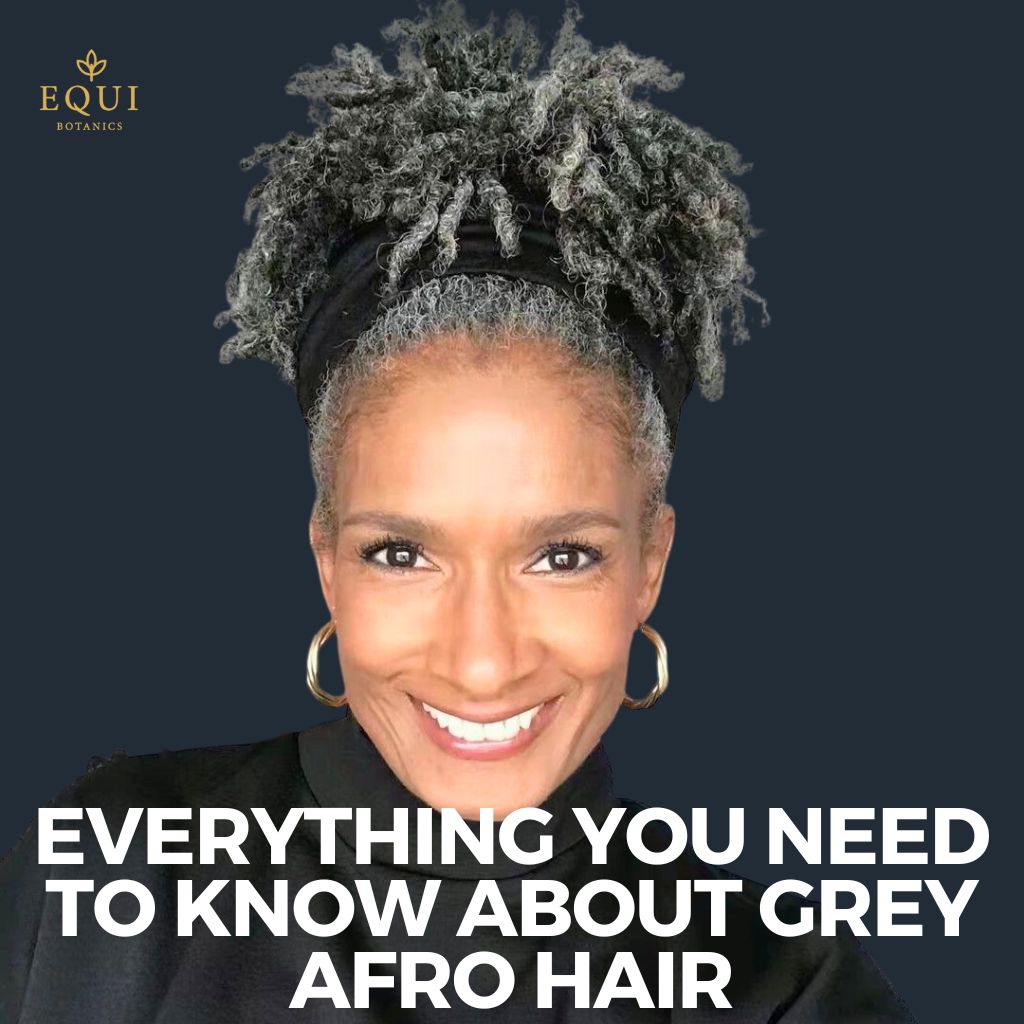
Key Summary
-
Hair colour is determined by melanin levels. With age, melanin production decreases causing hair to go grey.
Grey hair is a natural part of the ageing process and cannot be prevented but you can slow the process with methods such as a well-balanced diet and good scalp care.
Avoid chemical hair products that can alter hair colour, and enhance your grey afro hair with complimentary hairstyles.
What Causes Grey Hair?
Our hair colour is determined by a pigment known as melanin, produced by pigment cells in our hair follicles called melanocytes.

As we age, these melanocytes gradually lose their ability to produce melanin, leading to a decrease in our hair's natural colour and the appearance of grey hair. The table below illustrates the types of melanin responsible for different hair colours.
| Hair Colour | Type of Melanin |
|---|---|
| Black | Eumelanin (black) |
| Brown | Eumelanin (brown) |
| Blonde | Pheomelanin |
| Red | Pheomelanin & Eumelanin |
A recent BBC report suggests that grey hair is the result of pigment-making cells losing the ability to mature, affecting the development of melanocytes. As the melanocytes reside in the same place as hair follicles, when hair sheds, the melanocytes activity becomes more sluggish and therefore, colour production also slows, causing grey hair.
Although grey hair can be upsetting for many people, it is a common occurrence. In fact, after the age of 30, the chances of having grey hair increase by 10 to 20% every decade. A study has shown that by the age of 50, 23% of the population will have grey hair, so if you’ve started to see some silver strands, don’t panic – you are not on your own!
Does Hair Turn Grey or Go Grey?
An intriguing aspect about our hair colour change is that hair doesn't actually 'turn' grey. When we say our hair is 'turning' grey, it might create an impression that the existing strands of hair are changing colour from their natural shade to grey, however, that's not how it works; it actually grows grey.
The origins of grey hair start deep within the hair follicles – the small tube-like cavities from where our hair grows. As previously mentioned, these follicles produce the melanocytes that produce melanin and give hair its colour, with the colour type dependent on the amount of melanin produced.
With age, the activity of the melanocytes decreases, and they begin to die which reduces melanin production. As a result hair strands have less pigment, causing the grey colour. In essence, the change in colour is due to new hair growing in with less or no pigment, not the existing hair changing colour. This process usually starts in mid-adulthood but can begin earlier for some individuals due to genetic factors or certain health conditions. It's a gradual process, which is why it might seem like the hair is 'turning' grey over time.
Why Do Some People Go Grey Quicker Than Others?

Over time, every person will experience some level of grey hair, but the rate and onset of this natural process will differ for individuals, depending on genetics.
Each person's genetic code contains instructions regarding when and how much their melanocytes will slow down melanin production, leading to the appearance of grey hair. This genetic predisposition explains why greying often runs in families; if your parents or grandparents turned grey early, it's likely you may see grey hairs earlier than others.
External factors can also accelerate the greying process, for example nutrient deficiencies such as vitamin B12, can impact the colour of your hair. A shortage of this crucial vitamin can limit the ability of melanocytes to produce sufficient melanin, leading to premature greying.
Other disorders such as thyroid conditions, can induce premature greying too. These glands regulate a host of essential body functions, including hair growth and colour and imbalances can disrupt the normal hair pigmentation process, resulting in greying locks.
Can You Prevent Grey Hair?
While it's not possible to prevent the greying process entirely, it's possible to slow it down. Some steps to slow down grey hair include:
1. Maintain a Well-Balanced Diet
A diet rich in fruits, vegetables, lean proteins, and whole grains ensures that your body gets all the nutrients it needs for overall health, including hair health. Certain nutrients, like Vitamin B12, folic acid, and antioxidants, can play a crucial role in maintaining the health and colour of your hair.
ℹ️ Eat foods such as fish, nuts, leafy vegetables and legumes to help maintain hair health and boost melanin production.
2. Adequate Intake of Essential Vitamins
Vitamins like B12, B6, E, and D3 are essential for hair health. A lack of these vitamins can lead to premature greying. Regularly consuming foods rich in these vitamins, or taking dietary supplements (as advised by a healthcare professional), can help maintain your natural hair colour longer.
3. Regular Exercise
Regular physical activity improves blood circulation, which in turn ensures an adequate supply of nutrients to your hair follicles. This can potentially delay the onset of grey hair.
4. Stress Management
Chronic stress can speed up the ageing process, and studies have shown it can contribute to grey hair. Incorporating stress management techniques like meditation, yoga or other relaxation exercises into your daily routine can help keep premature greying at bay.
5. Avoid Smoking
Smoking has been linked to premature greying. It not only affects your overall health but can also lead to poor hair health, including loss of colour.
6. Regular Check-Ups
Underlying health issues, such as problems with the thyroid or pituitary gland, can cause premature greying. Regular health check-ups can help detect and address these problems early, potentially slowing down the greying process.
7. Scalp Care
Just as skin needs regular care and attention, your scalp also needs a proper care routine to maintain overall hair health, including the vitality and richness of your hair colour.
A healthy scalp can delay the onset of grey hair by ensuring that the hair follicles are well-nourished and performing their functions, such as melanin production, efficiently.
Performing regular scalp massages to encourage fresh circulation, protecting your scalp from the sun, and exfoliating your scalp to remove build up can all help maintain scalp health.
How Do You Take Care of Grey Afro Hair?
Grey afro hair requires special care due to its dry and fine nature. Here's a guide on how to care for it:
Use Naturally-Derived Shampoo
Gentle shampoos free of harsh chemicals, such as the Baobab Cleanser & Detangler, to help remove build-up without stripping the hair of its natural oils.
Baobab Hair Detangler & Cleanser
We prefer to avoid calling this a detangling shampoo. Instead, we call ours a detangling cleanser because it’s softening and moisturising while cleansing thoroughly. It also acts as your pre-poo detangler before you wash. Are you tired of that stripped feeling after you’ve just washed your hair? Wash your hair not strip it of its natural oils.
Invest in Hydrating Products and Treatments
Moisture is key to maintaining the health and lustre of grey hair. We would recommend investing in products that focus on nourishing locks and maintaining moisture, for example, the Nourish & Revive Deluxe Set, which uses a range of natural oils to keep locks in tip-top condition.
Nourish and Revive Deluxe Set
We've jam-packed this Nourish and Revive Deluxe Set with luxurious ingredients to give you a kickstart on your hair growth journey. We've selected our best-selling and hair replenishing treatments as part of the set. And because we really want you to have a great time, we're giving this set away for less than getting each product individually.
Use Nourishing Hair Oils and Leave-In Conditioners
These products provide the necessary moisture and nutrients your hair needs.
Deep Condition Once a Week
A weekly deep conditioning hair mask, such as the Babassu Treatment Hair Masque, can help restore moisture and improve the hair's overall texture and appearance.
Babassu Oil Treatment Hair Masque
The Babassu Deep Treatment Hair Masque is an intensive protein-moisture balanced treatment that applies a restorative formula to the hair, using steam to encourage absorption into the hair shaft. It is jam-packed with Brazilian butter, Tucuma and Murumuru seed butters and revitalising oils to nourish your hair. It’s so rich and gets to work for longer, you only need to apply it once or twice a month.
Moisturise Daily if You Wear a Protective Style
Using a daily mist, such as the Rice Water & Green Tea Hair Tonic, will ensure your hair remains hydrated and protected.
Rice Water and Green Tea Hair Tonic and Detangler
The Rice Water and Green Tea Hair tonic is jam-packed with natural, detangling and hydrating botanicals for refreshing hair daily. It is very effective on gym days when the hair is dried out from sweat so you can feel confident after a workout. The Rice Water and Green Tea hair tonic is also effective when used for detangling hair on wash days to save hours before applying the cleanser.
How to Enhance Grey Afro Hair Naturally
Afro grey hair can be enhanced naturally using various ingredients and methods:
Natural Ingredients
Fenugreek seeds, henna for dying afro hair, and black seed oil have been known to help reduce the appearance of grey hair and even enhance the silver. Using a product, such as the Black Seed Hair Oil Elixir, can work to prevent greying and darken existing grey strands.
Use Purple Shampoo
Using a purple shampoo can neutralise any dull yellow or brass tones, creating an on-trend cool grey toned shade that is fun and bright.
Choose Enhancing Hairstyles
Certain hairstyles can enhance the look of grey afro hair. Consider styles that highlight your grey hair, such as braids or twists. Or for grey short afro hair, consider keeping your hair natural.
What to Avoid with Grey Afro Hair
Certain practices and products can be harmful to grey afro hair:
Avoid Harsh Chemical Shampoos
Chemical hair care can strip the hair of its natural oils, leading to dryness. Sulphates in particular, are known to be damaging and can potentially alter the colour of a grey afro.
Avoid Hair-Drying Habits
Heat and certain drying methods can cause damage and lead to hair dryness. Keep heat application to a minimum and consider switching to air drying wherever possible.
Keep Hair Protected from the Su
Overexposure to the sun can cause hair to become dehydrated, leaving it frizzy and prone to breakages. Wear a hat in extreme sun conditions and keep locks protected with a UV protectant spray
Conclusion
Understanding and caring for hair involves more than just the recognition of a colour change. It's about understanding the science behind the greying process, adopting the right hair care practices, and avoiding harmful habits. With proper care and attention, your hair can be a beautiful expression of your unique journey through life.


